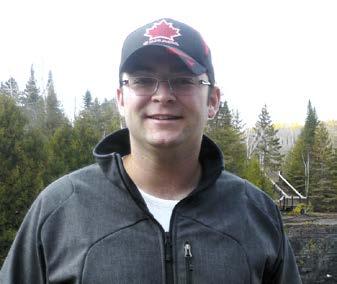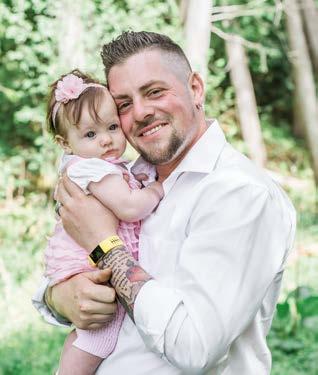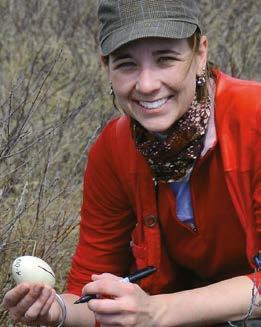
19 minute read
Millennnials in the Workplace Success Stories
MILLENNIALS IN THE WORKPLACE
ELIZABETH (BIZ) ROE PFEIFER ’85
When I was asked to write an article on Millennials in the workplace, the first thing that popped in my mind was … “that’s interesting, because right now we are living in what I believe to be an interesting time for employers.” Why? Because today, looking across a typical company, you can find up to five generations of employees sharing office space: pre-boomers, boomers, Generation X, Millennials and Generation Z.
Millennials certainly do have their share of expectations, but luckily, these expectations or values cross over into other generations as well. I will highlight a few of these important values, but do not want to go into too much detail in these areas, since so much of what you read today about Millennials covers this. Rather, I would also like to include the importance of culture: how the culture of organizations plays a very important role in keeping all generations engaged, including Millennials. The response to this question paints a very clear picture of where the organization may be struggling and where help is needed.
To me, corporate culture is the heartbeat of an organization— everything feeds off this, just like the human heart, which needs things such as nourishment, exercise and sleep to stay healthy. Companies need strong communication and a clear understanding of what is important to
their employees to keep engagement high and the business flourishing (healthy profits).
So why the interest in Millennials? It is because the reality is that Millennials have taken over the office. According to Statistics Canada’s Demographic Estimates, Millennials are the largest generation in the workforce today. This should not be shocking considering Millennials are the most influential population in our market today, as they are reaching their peak employment years.
Millennials have had, and continue to have, a big impact on the office by influencing what they perceive office life should be like and how relationships between employers and employees should be structured. In order to have the most Millennial-friendly workplace, there are a few things you should know about the generation that will represent nearly 75% of the work force by 2030.
They want career opportunities: Millennials are eagerly expanding their experience and responsibilities, more than generations before them. Millennials often crave experience over other kinds of rewards. They want to use their talents and strengths to do what they do best every day. They want to learn and develop—they want their boss to be a great mentor, someone they can learn from. They want ongoing feedback, clear goals, and collaborative goal setting, which gives them an opportunity to be part of setting performance expectations they see as fair, relevant and challenging. No more once-a-year performance reviews, which were often one-sided and demotivating. More frequent and informal check-ins with managers allow employees to better see how their day-to-day work is linked to the organizations goals, which helps increase employee engagement.
They want their job to fit their life. The benefits and perks that Millennials truly care about are those that offer them greater flexibility and autonomy to lead a better life. Many feel so strongly about this that they are willing to change jobs for a specific benefit or perk. They want benefits and perks that will have direct impact on their lives and the lives of their family members. Gallup research on the Millennials revealed that they care deeply about work/life balance, and place importance on having a life, not just a job.
Flexibility and working remotely are part of this. Millennials want to be able to work remotely from home or from a coffee shop part of the week. They do not want to be forced to work from their office desk every day. In addition, their work has to have meaning and purpose or they will not be engaged and motivated on the job. If they feel their job does not have these things, then they will leave for a role where they will continue to learn and grow. The reality is that most Millennials have grown up in an environment in which they’ve been constantly kept busy. With hockey, dance, and piano lessons, there was no free time.
You need to engage and excite your employees by changing things up. Modify responsibilities, provide stretch assignments or rotate staff in assignments. Provide opportunities to learn and grow. Send them on workrelated trips such as visits to customers or conferences.
The interesting thing is that the expectations or values Millennials have are desired by almost everyone. It’s unfortunate that it has taken the rise of the Millennials for some employers to recognize the need for changes within the workplace. Regardless of generation, there is an agreement on what is needed for employees to be happy and productive.
It is also important to note that regardless of education, skill and years of experience, it is integral to ensure that the employees being hired or that are employed within a company are a good fit with the corporate culture. If this step is missed, regardless of the programs offered, the company will have a difficult time motivating the mismatched employee of any generation.

– Gallup
Shutterstock.com © one line man
Having a strong, unified corporate culture has clear benefits for a company. But you may ask, “Why is identifying corporate culture so important?” A company’s culture is the only thing that can truly set it apart from other companies. The products or services that it produces can be duplicated. The only truly unique identifiers are the values and norms of the company. A corporate culture defines the way in which the employees of a company interact with one another and how they interact with the outside world, specifically partners and suppliers. In short, it’s the company’s personality!
No company can build a strong culture without people who either share its core values or possess the willingness and ability to embrace those values. That is why many companies have very thorough recruiting processes to find new employees who are not just the most talented, but also the best suited to a particular corporate culture. People stay with cultures they like, and hiring the right cultural fit reinforces the culture an organization already has.
So, assuming you have hired Millennials who are a great cultural fit, there are several ways you can keep them motivated. But you will receive the best results if you tailor your engagement strategy to suit your employees, specifically for those from a younger generation. Regardless of what you know about the different generations and expectations of these generations, you need to learn what motivates them—it could be career development, flexible work environment, compensation, or any number of things. The best way to get information on what is important to employees is through interactive meetings and/or surveys. This feedback should be collected annually, at minimum. It’s important for companies to stay on top of the forever changing employee environment and to create internal benchmark data on employee engagement.
An engaged employee is a loyal employee—or, an engaged Millennial is a loyal employee!
Elizabeth Roe Pfeifer is a human resources business consultant with ParachuteHR. She is the former Vice President–Organizational Development at BlackBerry Ltd.
HARD WORK AND HAPPY COINCIDENCES
Finding Careers in a Tough Millennial Job Market
Trent Alumni Share Their Stories
Young university graduates have always faced a tough challenge when looking for meaningful, careerstarting employment. There is an annoying, age-old paradox: young workers lack extensive experience on their resumes, but can’t gain this valuable experience without actually getting hired. For today’s young grads, the situation is even more dire. The job market is tighter than it’s ever been —and the jobs that are out there are usually short-term or contracts, lowwage, and heavily-weighted towards entry-level positions. This can often mean a stressful period of frustrating employment experiences before a career eventually blossoms.
But here’s the good news: these careers eventually do. And the time that Millennial grads spend in the formative stages of their careers usually does pay dividends.
We reached out to several successful Millennial alumni for their experiences forging a career and for some tips on how to navigate the hyper-competitive employment market.

SANA VIRJI ’12 and RIBAT CHOWDHURY ’11 Owners, Ribitt
Peterborough tech startup Ribitt is, perhaps, a perfect example of Trent University innovation and entrepreneurial spirit. It is also a thriving small business that is springboarding two young alumni, Sana Virji and Ribat Chowdhury, to career success. An app that promotes small businesses while offering rewards to shoppers and diners, Ribitt began as part of a fourth-year business administration class. Ms. Virji and Mr. Chowdhury competed in—and won—Trent’s Entrepreneurship Week $5 Challenge in November of 2014 as they signed 43 businesses in five days to a then-paper-based, bar-coded coupon discount service. They earned more than $6,000. That number has swelled since then and the coupon book has gone a lot more high tech.
“There were so many downtown businesses that we loved to frequent,” says Ms. Virji. “And we noticed that not many of the people that we knew from the Trent community were going to them. So we decided to try
something new to bring students and faculty members downtown to these stores and restaurants.”
The $5 Challenge sees students getting five dollars and five days to create a new business. During their five days, Ms. Virji and Mr. Chowdhury designed and printed a pilot coupon book and hit the streets. The pair promised to get the booklet into the hands of 1,000 students and sold the service at $150 per business. It was an immediate smash success.
“It holds the unofficial record for Entrepreneurship Week,” smiles Ms. Virji. “And we keep hearing that it was the best $150 many of these businesses ever spent on marketing.”
The pair have moved the program to an app-based model and have continued to grow the business. They are currently looking to expand to other similar-sized markets.
“I think the secret to our success was understanding the marketing budget of small businesses,” notes Mr. Chowdhury. “And how leveraging the collective power of these small businesses was the secret to competing with larger chain stores outside of the downtown core.”
“Also, just going for it,” adds Ms. Virji. “More important than a formal business plan or wealth of market research, we took an idea and tested it. Sometimes you just have come up with a good idea and go from there.”
EVAN LYONS ’09 Senior manager, Analytics Program, Interac Association and Acxsys Corporation
“It was an unconventional road for sure,” says Evan Lyons of his career path. Now a senior manager with Interac’s Analytics program, Mr. Lyons graduated with a B.A. (Hon.) from Trent in Political Studies and History and a M.A. from Wilfrid Laurier in International Relations, and didn’t really consider himself a numbers or data person.
“Just out of school, I got a job with Ipsos Reid doing market research,” he recalls. “Which had absolutely nothing to do with either of my degrees. And I really wasn’t engaged in it. It was numbers without context or strategic input. So, when an opportunity with Interac came up, it caught my attention. I was interested in where that type of analytics work could lead and what it could build into for a company.”
Mr. Lyons may not have had the prerequisites for the position, but he had the pluck and courage to reach out to the hiring manager. He pointed out that he was interested in the posting and where the company was headed.
“I told him that I didn’t have some of the skills required, but had several others that I thought could be important to bring to the table,” he says. The two sat down for a conversation and came up with a pitch where Mr. Lyons would teach himself necessary aspects of the job— including computer programming languages.
Since then, he has grown from a business intelligence analyst to the senior management position he holds now.
“You shouldn’t be afraid to reach out,” he advises. “It takes more than just putting a resume into a portal. Sometimes you need to reach out personally, through LinkedIN or by grabbing a coffee with someone. You need to put yourself out there and have the confidence to know that you may not have X, but you can definitely bring Y.” But Mr. Lyons also cautions to be strategic. “I remember creating a kind of form letter, where I would just sub in a person’s name, company, and position. Sometimes I’d get answers where people would give positive tips on my resume. But I’d also get negative ones that pointed out I was too aggressive or assuming that they’d somehow just give me a job. Eventually, someone sat down with me and helped with my approach. I learned that outreach, such as LinkedIN messages, should be more probing—it should be more about the other person, and their business, than you. People like to talk about themselves and are much better at telling their experiences than explaining how to do something. You can learn a lot. And you can make people a lot more receptive.”
JARRET LEAMAN ’05 Director, Business Development and Philanthropy, Troon Technologies Founder, The Centre for Indigenous Innovation and Technology
“I’m an entrepreneur,” says Jarret Leaman. “But I never wanted to be. I’m also an advocate. And that’s something I’ve always been drawn to.” Mr. Leaman’s career is two-pronged, successful, and busy. On one hand, he is a booking agent with a roster of highly successful talent. On the other he is an Aboriginal advocate who has worked bettering First Nation education, business opportunities, entrepreneurship, and inclusion into the tech industry. He’s worked alongside powerful Canadians, such as Bob Rae, and is a recipient of the Sovereign’s Medal
Shutterstock.com © one line man of for Volunteers, presented by the Governor General of Canada. Not bad for a person who only graduated from Trent in 2009.
His role as a booking agent came about through flexibility and a desire to help.
“I had friends who asked me to manage their bookings and their tours,” he recalls. “But I didn’t study entertainment management; I studied policy.”
Nonetheless, his drive has allowed his business to flourish to the point that he now has two acting agents, a lawyer, a makeup artist, stylists, and a PR person helping his clients.
His advocacy work started at Trent and then grew as he both attended and worked at Queen’s University. He has held senior positions at the Aboriginal Professional Association of Canada, the Aboriginal Institutes Consortium, the Canadian Council for Aboriginal Businesses, and the Council of Ontario Universities.
“I have been in the right place at the right time,” says Mr. Leaman. “I was told early on that that the market for Indigenous people with my skill set was very, very minimal. I took advantage of positions advocating for Indigenous people—positions, really, only available for Indigenous people. But I worked as hard as I could and learned as much as I could. I think it’s important to analyze opportunities and how they align with where you want to go with your career.” JOSH ANNETT ’03 Senior policy advisor, Water Management and Dam Infrastructure, Ministry of Natural Resources
“It’s funny,” says Josh Annett of his position with the Ministry of Natural Resources (MNR). “As a guy who really isn’t technical, I ended up in the dam management world of the Ministry.”
As with many of the alumni featured here, Mr. Annett found that adaptation was key to success.
“Employment opportunities evolve, and you evolve, and you eventually find a niche,” he explains. “It’s worked out pretty well, for me, anyway.”
Not that he planned it out that way. Graduating from Trent, Mr. Annett returned to Oakville, where he had previously worked during summers. He applied to the MNR during his last year of eligibility for summer student positions and just managed to squeeze in.
“The person I applied to, by chance, just happened to be someone I knew from Trent. And I was really fortunate to get in. I did a respectable job during my four months there, so they keep me on.”
What followed was a series of contracts—some lasting as short as eight weeks.
“I’d be in the position of finding out on a Friday whether or not I’d be coming to work again on the Monday,” he recalls. It was a stressful situation that many Millennial grads know all too well.
“The secret was to keep expressing my desire to stay, to work hard, to network with people and build relationships, to help others out as much as possible, and to keep being noticed—in the right way.”
Eventually he worked his way into an 18-month internship, followed by even more contracts. But, by then, he was able to apply for internal positions. Four-and-a-half years after he started, Mr. Annett finally beat out competition for a permanent position —that of a junior policy advisor. Gaining experience, he has continued to move up within the Ministry.
He’s the first to point out how stressful contract work can be. “It’s really tough. You don’t have a safety net. You’re paying bills and not knowing if there is a next contract to pay your cost of living. All you can do is to make sure you are trying your best. All the time. When it comes to hiring, people talk. So your reputation becomes hugely important.”
Mr. Annett points out that it is not the technical expertise or knowledge that has kept him employed.
“It’s the soft skills that all Trent grads have. Interpersonal skills. The ability to collaborate with others. The ability to take a complex issue and summarize it for decision makers. It is being able to communicate, write, and give presentations that have helped me the most—and will probably help others as well.”

BRIAN COSTELLO ’02 Independent real estate developer, Forensic mental health registered nurse, Ontario Shores Centre for Mental Health
A typical day for Brian Costello is getting up, spending a bit of time with his wife and 5-year-old, working a 12-hour shift, then touching base with his business partners about his commercial real estate business, squeezing in a bit more family time, and then getting rest for another big day.
But then, Mr. Costello has always been busy—which is one of the secrets of his success.
Being accepted to university in his OAC year of high school, he went on to four straight years of Dean’s List academic success before completing an B.B.A. in Human Resources Management and Marketing from Trent, an M.B.A. from Brock and a B.Sc. in Nursing (again from Trent). He has been a teaching assistant for accounting courses here, helped create a $20,000 endowment fund for business students, and continued to take part in Life After Trent networking sessions.
Most of this, he stubbornly did his own way, spurning help from others.
“My one piece of advice to students and to young alumni is to not do what I did,” he laughs. “My father had 32 years of work experience, but rather than listen to him, I always did things the way I thought best. I’ve since learned that, if there is a helping hand available, take it. Take advice. Network with as many people as possible. Pound the pavement. Meet as many people as possible—even if you have to spend a few dollars buying coffees or attending events. And definitely go to events. The Life After Trent program is a great one for that. Never turn down an opportunity to pick a brain or impress someone. Remember that you really don’t know everything—even if it feels like you do.”
Mr. Costello’s work is demanding. The long hours are tough, but they have allowed him the freedon to carve out the life that he wanted to create. That meant sacrifice. And sometimes taking positions didn’t seem worth it at the time.
“Don’t think you’re better than your job,” he cautions. “Take something you are going to learn from, even if it isn’t ideal. Look for anything in an industry that you are interested in. Eventually, your skills are going to show through.”

JENNIFER ROBUS ’03 Senior policy advisor, Ontario Ministry of Natural Resources and Forestry
“I got here by accident,” says Jennifer Robus of her role as a policy advisor. “I fell into an internship because of a master’s project I worked on at Trent. I was looking into climate change impacts on First Nations communities on Hudson’s Bay and ended up working with the communities up there—which I didn’t know I would be doing. It terrified me. But it intrigued me. And in my time working with communities in Peawanuck, Moose Factory, and a bit in Attawapiskat, I decided it was something that I really wanted to do. The science was cool. And the research was cool. But there was something about working with the people there that I wanted to continue doing.”
When she applied for an internship with the MNR that focused on Aboriginal relations, it ended up being a policy position.
“Not necessarily the type of role I thought a graduate degree in the sciences would have led me to,” she admits. “The short version of my career path is that I took a chance on a job that I didn’t think I’d like and ended up with something that I really want to do. And seven years later, I’m still here!”
Ms. Robus believes that part of her success stems from the fact that she’s working on climate change in the North and with First Nations, Métis, and Inuit communities—issues that are gaining plenty of government attention. But also because she partially knew what interested her.
“Having an area of interest that you want to work in is hugely important,” she advises. “Even if you don’t particularly know what it is you want to do.”
With a long-time interest in environmental sciences and biology, Ms. Robus flirted with a number of career ideas: teaching, tech work, doing research. She didn’t, however, let herself get hooked on any one long-term career choice.
“My mentors at Trent told me not to worry,” she recalls. “That I’d be fine. That I’d end up doing something I enjoyed and that I was just taking my time figuring it out. I learned that, while its good to have a focus, you don’t need to be overly stressed about having a focus. I learned to be flexible and to try new things.”
Between the advice, a newfound sense of adaptability, and a happy accident, it worked out just fine.








